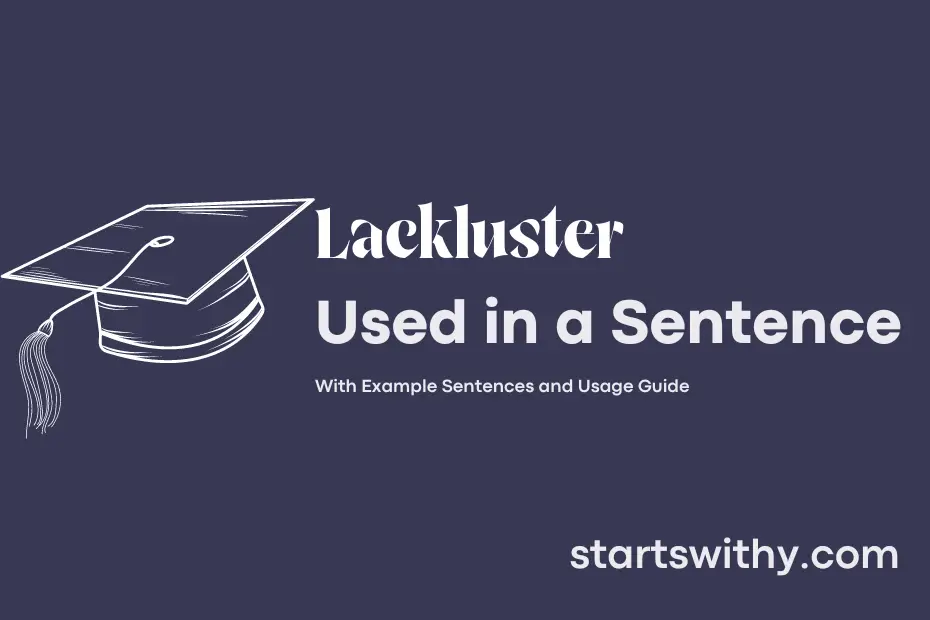Have you ever struggled to convey your thoughts effectively, only to end up with lackluster sentences? The term “lackluster” refers to phrases or expressions that are dull, unremarkable, or uninspired.
When crafting written communication, it is crucial to steer clear of lackluster sentences that fail to engage your audience. By understanding how to recognize and avoid lackluster writing, you can elevate the impact of your messages and effectively get your point across.
7 Examples Of Lackluster Used In a Sentence For Kids
- The party had a lackluster decoration.
- The performance was lackluster and boring.
- The plain shirt looked lackluster without any design.
- The movie was lackluster, and I fell asleep.
- The rainy day made the park seem lackluster.
- The old painting had a lackluster appearance.
- The story had a lackluster ending.
14 Sentences with Lackluster Examples
- Lackluster attendance at the seminar indicated a general disinterest among the students.
- The students were disappointed by the lackluster response to their fundraising event for a social cause.
- The club’s final event of the semester turned out to be lackluster due to poor planning.
- The student presentations received lackluster feedback from the professors.
- The campus café’s food options have been described as lackluster by many students.
- The college’s annual cultural fest turned out to be lackluster this year due to budget constraints.
- The student council elections had a lackluster turnout, with only a few candidates running for positions.
- The guest lecture on entrepreneurship was met with a lackluster response from the student body.
- The sports team’s performance has been lackluster this season, disappointing both players and supporters.
- The college library’s collection was deemed lackluster by students seeking more diverse material.
- The student debate competition had a lackluster finale, with the audience expecting more excitement.
- The college’s career fair had a lackluster selection of companies this year, disappointing job-seeking students.
- The student art exhibition received lackluster praise from the visiting art critics.
- The college’s academic support services were considered lackluster by students struggling with their studies.
How To Use Lackluster in Sentences?
To use the word “Lackluster” in a sentence, follow these steps:
-
Understand the meaning: Lackluster is an adjective used to describe something that is unimpressive, dull, or lacking in vitality or brightness.
-
Choose the right context: Consider situations where something is underwhelming or not as exciting or impressive as expected.
-
Structure your sentence: Start your sentence with a subject followed by a verb. Insert the word Lackluster to describe the unsatisfactory aspect of the subject. For example, “The team’s performance was lackluster during the championship game.”
-
Add more detail: To enhance your sentence, include specific details or examples that illustrate why the subject is Lackluster. This can help provide a clearer picture for the reader.
-
Practice using it: Write a few practice sentences using Lackluster in different contexts to become more comfortable with the word. For instance, “The movie received lackluster reviews from critics,” or “Her presentation was lackluster, lacking enthusiasm and new ideas.”
Remember, using Lackluster can help you express disappointment or the feeling of something being subpar. Incorporating this word into your vocabulary can make your writing more descriptive and varied.
Conclusion
In conclusion, sentences with lackluster wording lack vibrancy and fail to engage the reader. They often come across as dull, repetitive, or uninspiring, making the overall message less impactful. These lackluster sentences can be improved by incorporating more descriptive language, varied sentence structures, and engaging details to captivate the audience.
By recognizing and actively working to enhance sentences that feel lackluster, writers can elevate their writing and effectively convey their ideas. Through the use of lively and compelling language, sentences can be transformed from mundane to dynamic, leaving a lasting impression on readers and ensuring the message resonates with clarity and enthusiasm.



